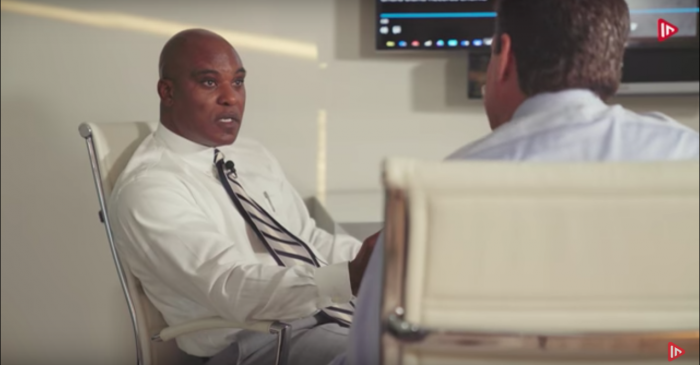
The video was explosive. It showed Sandra Bland — the black woman who died by suicide in a Texas jail cell after being pulled over by a state trooper who was later fired — interacting with the trooper. But unlike previous video, this one was shot from her own perspective, recorded on the cell phone in her hand. (The trooper had said he feared for his life, but the video showed nothing significantly life-threatening.)
When investigative reporter Brian Collister showed it to Bland’s family and their attorney, it was the first time they’d seen it. The attorney was in shock after the clip ended.
“Where’d you get that? I’ve never seen that,” said Cannon Lambert, who represented the Blands in their federal civil rights lawsuit. “It wasn’t on anything we had. How is that possible? Where did you get that? That’s her cell phone.”
Everything was caught on camera — original trooper’s car dash cam, Bland’s phone, and the attorney’s reaction. And it was researched, reported, compiled, and edited by Collister, the CEO and chief investigative reporter of Investigative Network, a new investigative journalism nonprofit aimed at bringing more investigative collaboration to TV stations.
He had obtained the video in a records request after following the Bland case while at KXAN, the NBC affiliate in Austin. Long story short, management reportedly kept the video off air and Collister left KXAN in January 2018.
“I was having that midlife career crisis of what to do next and applied for some regular old TV jobs, halfheartedly. I thought maybe I’d reach out to some nonprofits. What I’ve seen with most nonprofits is they’re driven by former print people who have transitioned to digital,” Collister said, who spent nearly two decades in Texas TV markets. “I can’t tell you how many times I see a digital story and think it would have been a good 10-minute, 15-minute, hour-long documentary piece.”
The Sandra Bland cell phone video and Collister’s reporting around it are shell-shocking and important (and impactful), but the model he’s trying to build is worth a look, too. Local TV news is still the most consumed and trusted source of news for U.S. adults — though the industry still largely prefers competition to collaboration. Station leaders say they plan to invest more in investigative reporting, but it’s also one of the most expensive kinds of journalism out there.Collister had watched the Texas Tribune and ProPublica grow into mega-million-dollar, impactful news outlets with their own investigative reporting. Why not combine all those powers? “My idea initially was those are 99.99 percent print/digital people [developing nonprofit newsrooms]. What if we applied the broadcast or video model to it?” he said.
So that’s what he’s trying to do, currently as the sole funder of Investigative Network. Collister said he’s met with journalism funders to no avail (yet) and has received several donations from new supporters since the Sandra Bland video first aired on WFAA and was picked up by stations and other outlets nationwide. He sees a path to profitability, built on licensing fees, donations, and collaboration, but is looking for the initial jet fuel to fully deploy the network. (The Institute for Nonprofit News, which used to be called the Investigative News Network, is this network’s fiscal sponsor while it awaits the IRS’s decision on its potential 501(c)(3) status.)
“We’ve proven what we can do and we’ve had impact — the Texas legislature has launched a full-scale investigation into what we’ve uncovered — and we haven’t had a single major donor,” Collister said. “We just need the funders to step up and help us get enough to go into orbit.”
“Not every station outlet has the ability to go out and put together a really compelling documentary video story,” Matt Goldberg, NBC’s vice president of content strategy and former assistant news director at KNBC, said. He’s on the board of Investigative Network and also Investigative Reporters and Editors. “It doesn’t matter how many people — I could build the biggest investigative team in the country, but I still want more content. If I take the approach of putting anything on, it’s going to be anything. If I put a premium on what Brian is trying to do, if it’s of substance and works with the brand I have, that’s a really win.”
At full scale, Collister envisions bureaus of investigative reporters who know how to uncover and tell a compelling story in video located in New York City, D.C., Atlanta, Denver, Phoenix, San Francisco, and Austin. But they could just be a small group of reporters with a desk in the back of a TV station already out there or at a university. And he already has more investigations in progress, though he asked me not to share the topics, with timing obviously contingent on funding.
Investigative Network could be the first of its kind, relying on the work that local TV stations have been doing for ages — with a collaborative, nonprofit twist, two pieces that have seemed antithetical to the TV news world.
“Up until this very moment you had to work for a TV station run by a large corporation with a FCC license with a tower with live trucks and hundreds of millions of dollars in equipment,” Collister said. “As of today we’re going to do, thank god, what the print people figured out.”